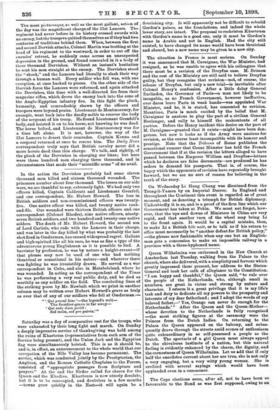The situation in France is most serious. On Sunday it
was announced that M. Cavaignac, the War Minister, had resigned, as he was unable to agree with his colleagues that there must be a revision of the Dreyfus case. M. Brisson and the rest of the Ministry are still said to believe Dreyfus guilty, but they recognise that revision—not, of course, the release of Dreyfus, but only a new trial—is inevitable after Colonel Henry's confession. After a little delay General Zarlinden, the Governor of Paris—a man not likely to be incapable, as no French Government, however ineffective, ever dares leave Paris in weak hands—was appointed War- Minister, and he, it is stated, has consented to revision. Meantime, Paris is much excited by the belief that M. Cavaignac is anxious to play the part of a civilian General Boulanger, and rally to himself the malcontents of all parties. Before the Henry incident this desire on the part of M. Cavaignac—granted that it exists—might have been dan- gerous, but now it looks as if the Army were anxious for revision, as the course least incompatible with its honour and prestige. Note that the Tribuna of Rome publishes the sensational rumour that Count Munster has told the French Government that if at the revision the letters alleged to have passed between the Emperor William and Dreyfus—letters which he declares are false documents—are produced he has orders to demand his passports. That is, of course, the- bogey which the opponents of revision have repeatedly brought forward, but we see no sort of reason for believing in the truth of the story.


































 Previous page
Previous page